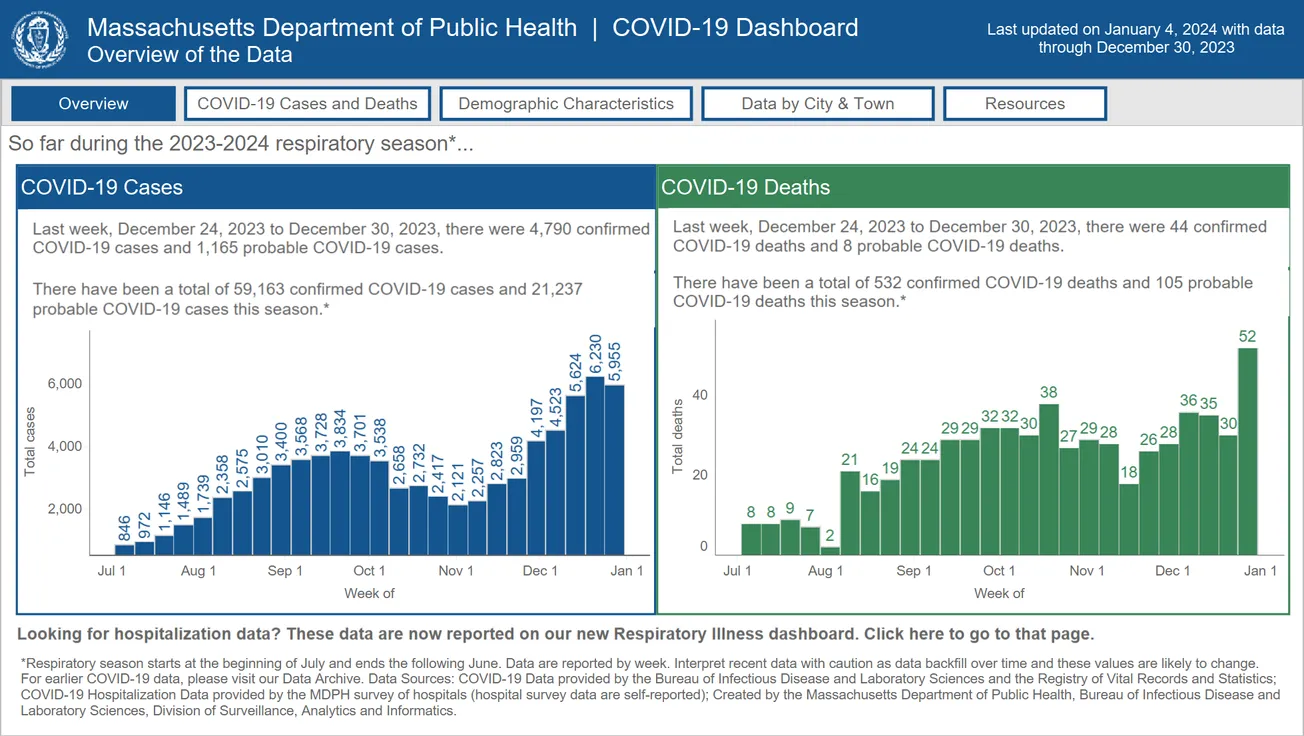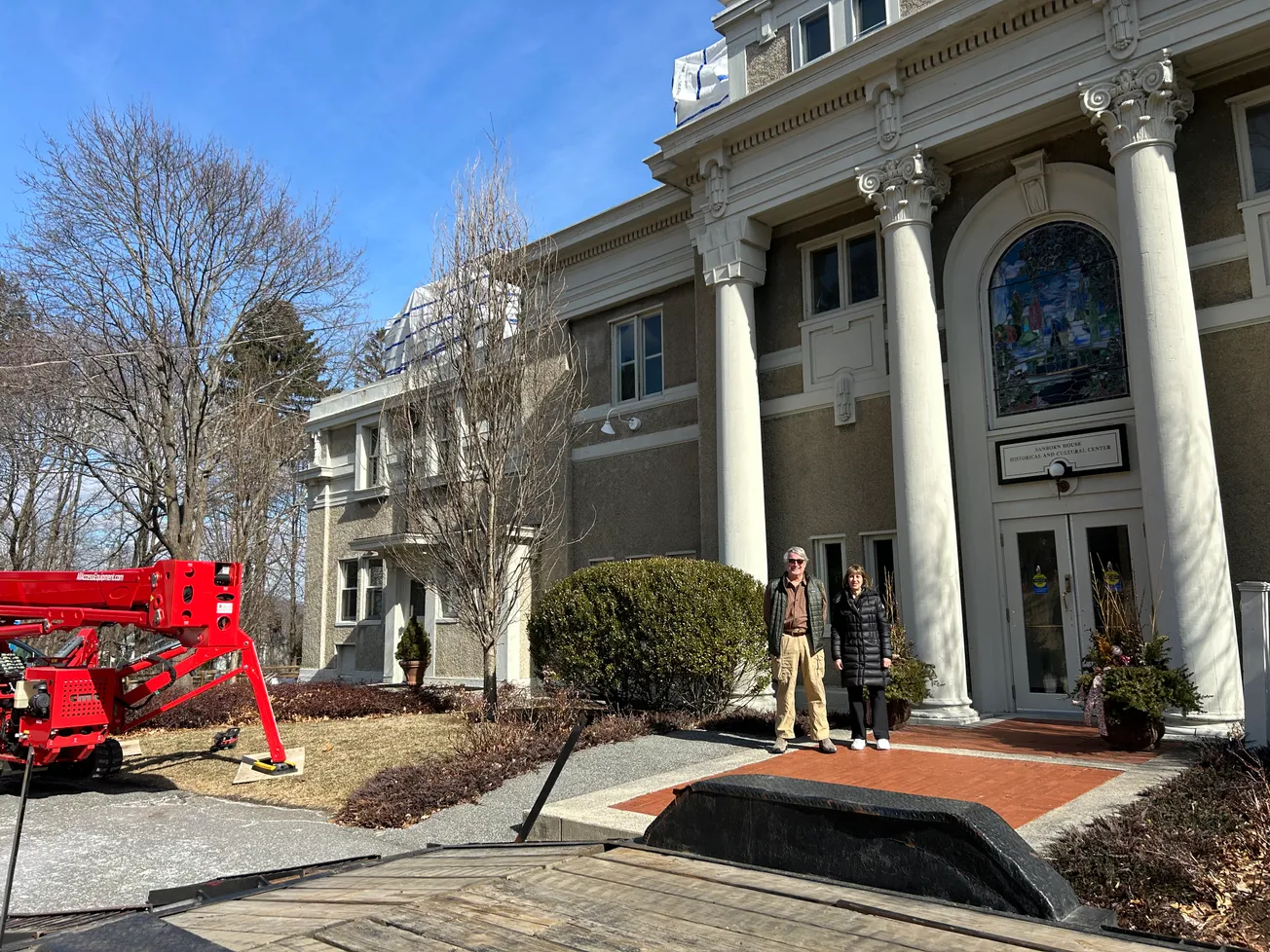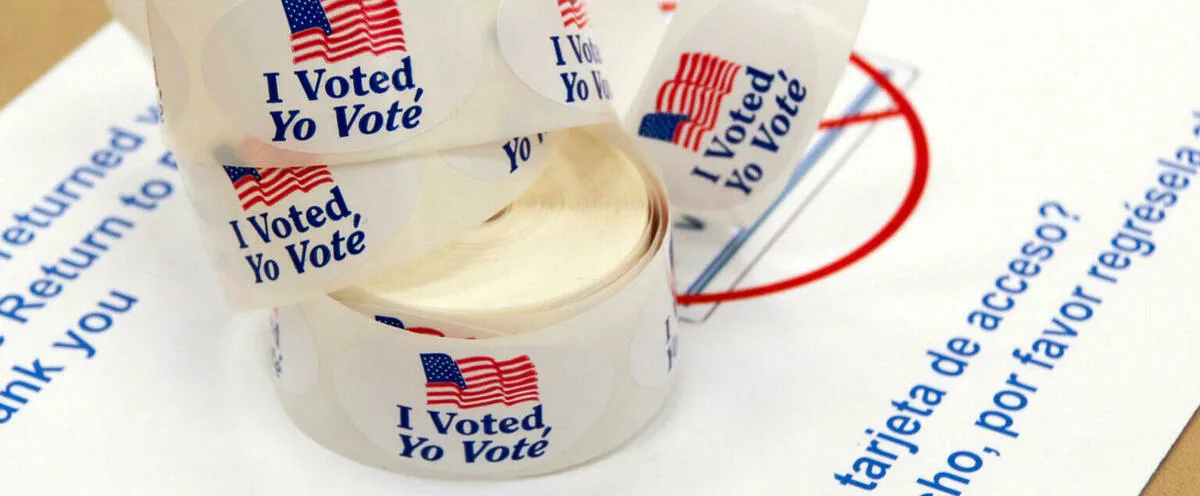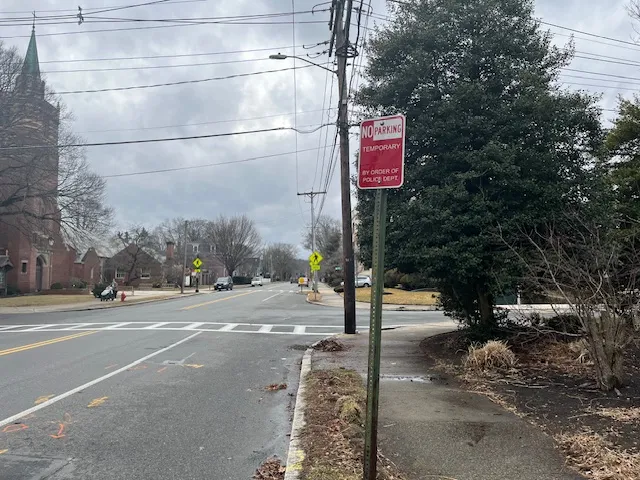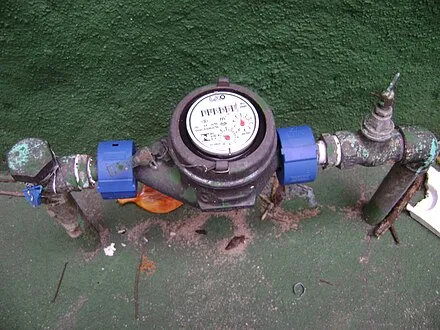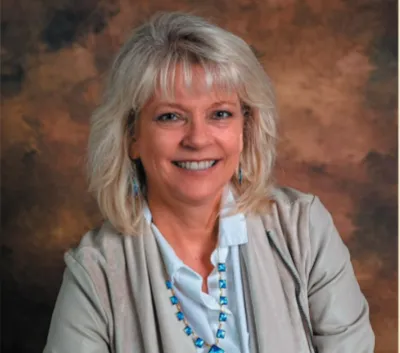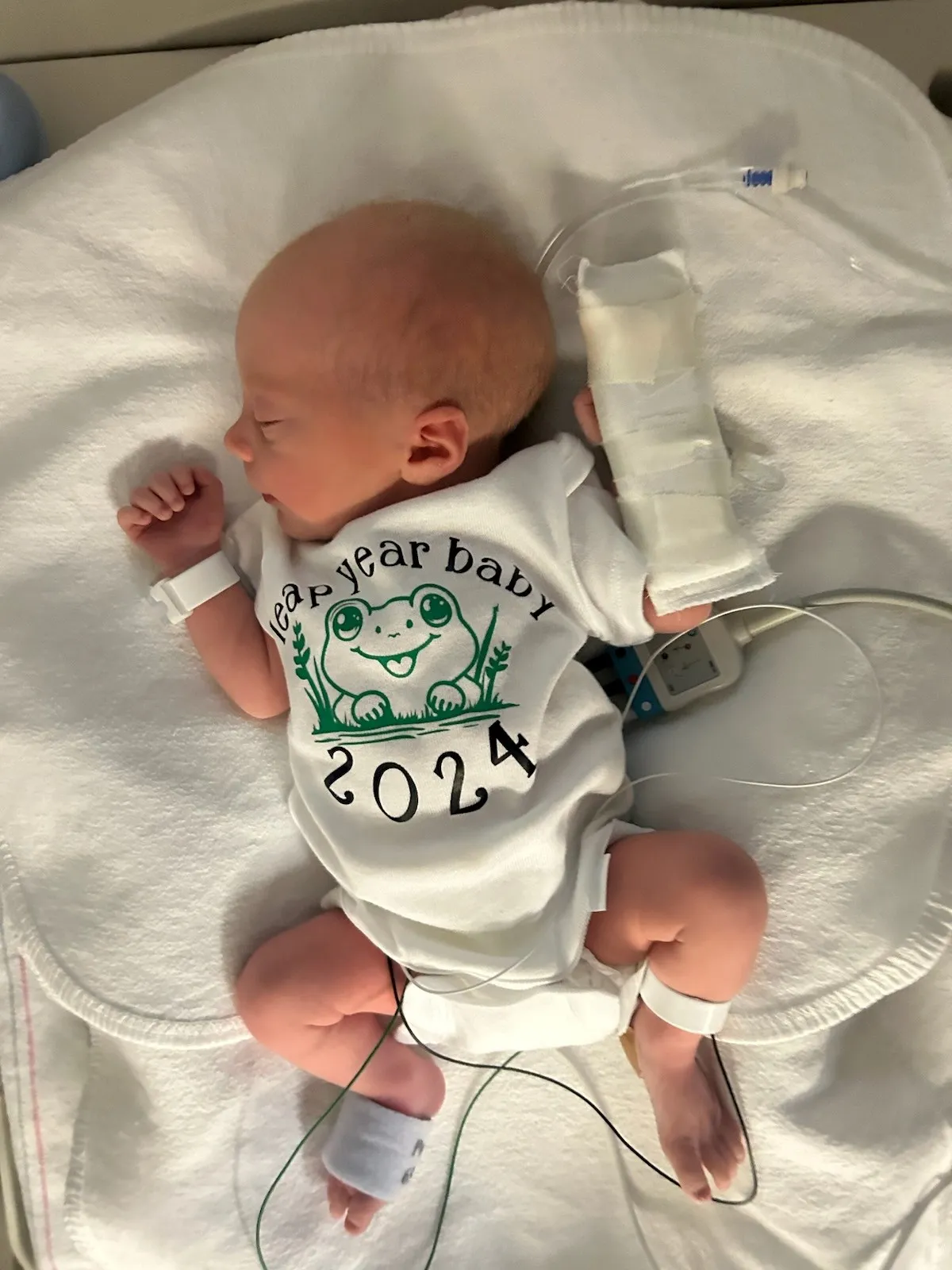Table of Contents
It’s winter in New England --- and that means it’s cold and flu season. But it’s also time for COVID-19 and other respiratory illnesses, such as RSV.
“Clearly, it’s winter so it’s common to see a rise of respiratory infections in winter,” said Dr. Larry Madoff, medical director of the Bureau of Infectious Diseases and Laboratory Sciences for the Mass. Department of Public Health. “People are close together because they’re inside more, there’s a dryness in the air and it’s easier to transmit droplets.”
Madoff said every respiratory illness season is different. While it’s common to see a sharp rise in December, he said there’s usually a peak in January. However, nothing’s for certain.
So far, there’s been a rise in all categories of respiratory illnesses across Massachusetts. According to the DPH dashboard, the 2023-24 season has more than 59,000 confirmed cases of COVID and probably an additional 21,237 non-reported cases by residents taking home tests.
A reporting season lasts from July through June of the following year. This year’s season has data beginning July 2, 2023 and goes through Jan. 4, 2024, with information being updated every Thursday.
The latest data from the week of Jan. 5, shows there were 5,955 new cases just that week. There have also been 52 deaths from COVID.
Winchester’s COVID report for the same week is at 753 confirmed cases, up from 153 in December while the COVID rate in Middlesex County for the current season is 836.2 cases per 100,000 residents.
Madoff said the last three flu seasons, since the arrival of COVID, have seen a sharp rise in infections. Additionally, the flu season has been “pretty severe.”
“Flu activity has been high,” Madoff said. “That’s been seen throughout the country.”
According to the Centers for Disease Control and Prevention, “seasonal influenza activity is elevated and continues to increase in most parts of the country” while hospitalizations are continually increasing.
CDC estimates there have been at least 7.1 million illnesses, 73,000 hospitalizations and 4,500 deaths from flu so far this season.
And don’t forget RSV, which Madoff said is very common and causes flu-like symptoms in healthy adults, but can be deadly to babies and adults over the age of 60.
“This is the first year that vaccines to prevent RSV infection have been available,” Madoff said. “They’re available for older adults, pregnant people and babies.”
Winchester Hospital is just one healthcare facility being inundated with sick patients. Officials there also recommend vaccines.
“As expected, we are seeing more patients presenting with respiratory viral illnesses which is usual for this time of year,” said Dr. Andrew Lubin, MD, chief of infectious disease and medical director of infection prevention at Winchester Hospital. “We recommend everyone get vaccinated for the flu and for COVID-19, and for RSV if your healthcare provider recommends it. Another good way to protect yourself is to wear a mask. If you feel sick, take a COVID test, even if your symptoms are mild. Check in with your healthcare provider for further evaluation and treatment, if needed.”
Why the rise in illness?
Despite what some would refer to as the annual uptick in illness, Madoff said a definite factor behind the sharp rises being seen is simply that people are not vaccinating.
“People are less protected,” he said, pointing to the fact that only 18 percent of Massachusetts residents have been vaccinated against COVID. “It’s important to get the new vaccination because your protection wanes and new strains adapt. Vaccines now provide better protection, but you need to get up to date.”
According to the data, only 18.5% of Massachusetts residents are vaccinated for COVID, 37.3% for flu and 260,294 for RSV. In Winchester, 55.7% of residents have gotten a flu shot this season.
Madoff said it’s not too late to get yourself vaccinated since the season can sometimes last into the spring. Because it’s so easy, he urged people to do it right now.
“It will protect you against illness,” he said. “And, it will also protect those around you.”
Another reason for the uptick in COVID, is a new strain of the virus called JN.1, which is related to the Omicron variant.
The CDC warned that as of Dec. 23, 2023, the JN.1 strain is predicted to be the most prevalent.
CDC projects “the variant JN.1 comprises an estimated 15–29% in the United States as of Dec. 8, 2023” and that it will continue to increase. It is currently the “fastest-growing variant” in the country.
The growth of JN.1 “suggests that it is either more transmissible or better at evading our immune systems. At this time, there is no evidence that JN.1 presents an increased risk to public health relative to other currently circulating variants.”
“COVID-19 activity is currently increasing in the United States. We expected this increase because COVID-19 has had a pattern of increasing and peaking in late summer, and then again peaking around the new year,” CDC reports on its website. “Right now, we do not know to what extent JN.1 may be contributing to these increases or possible increases through the rest of December like those seen in previous years. CDC will closely monitor COVID-19 activity and the spread of JN.1.”
According to Mass.gov, DPH is continuing to track COVID-19 via wastewater surveillance from treatment plants statewide. State officials say this is the best way to track the virus because when a person has the virus, it is shed in their stool.
“Wastewater data can also help us track trends in the number of people that have COVID-19 in a community,” the site says. “The amount of virus that a person has in their stool and the length of time that they have virus in their stool varies. Because of this, the amount of virus measured in wastewater does not tell us total number of cases in the area and does not tell us the amount of increase or decrease in cases in communities. However, if the amount of virus in wastewater increases or decreases over several time points, that information shows that cases are either increasing or decreasing in the community. Importantly, wastewater data can provide an early warning about increasing cases since virus will show up in wastewater several days, maybe even a week, before positive test numbers start to increase.”
Because of the number of home tests, officials believe wastewater tracking is a better indication of COVID-19 in communities than confirmed tests from hospitals or doctors’ offices.
Madoff said it’s important for people who are sick, no matter what they have, to stay home and take care of themselves.
“Stay home, test for COVID and even if you’re just coughing or sneezing, stay away from other people,” he said. “Keep your respiratory illness to yourself.”
And don’t feel the pressure to keep up with your usual amount of activity, Madoff added, just take it easy and heal up. And of course, anyone age 6 months or older should go get vaccinated.
“Fifty-two people died this week from COVID and that’s just in Massachusetts,” Madoff said. “These respiratory illnesses are not only serious, but they can also be lethal.”

